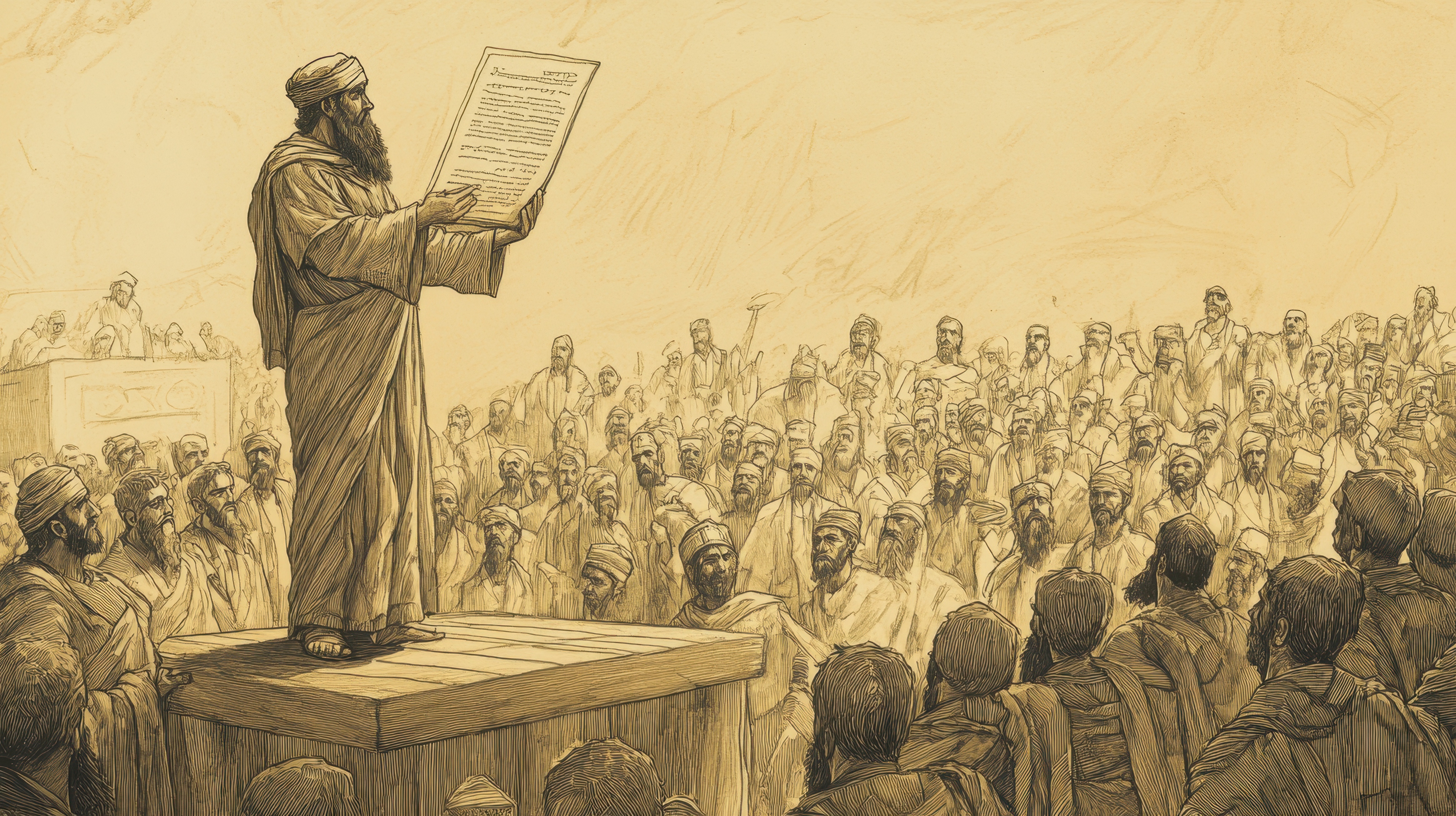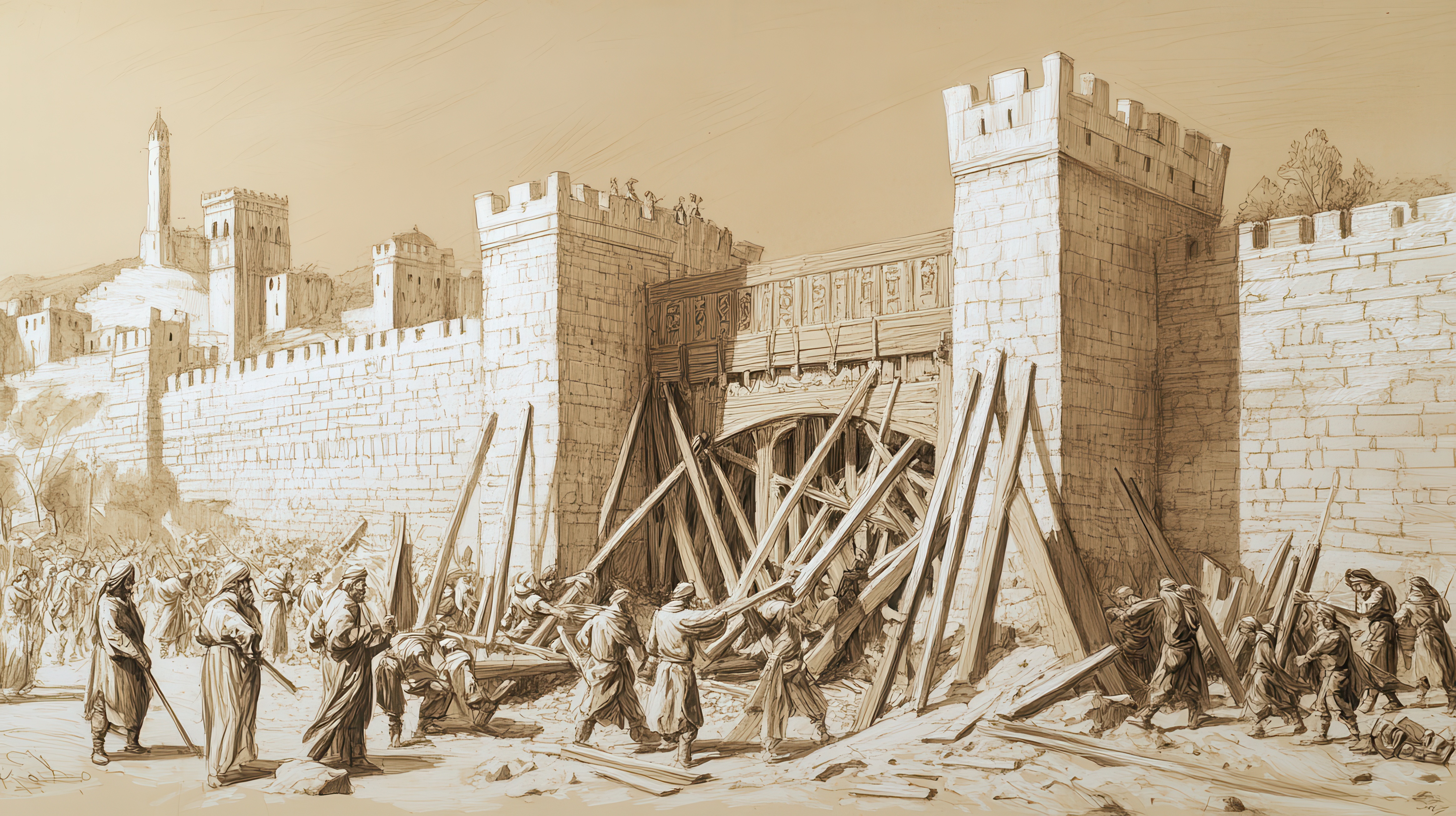Nehemiah 13 Final Works

Nehemiah returned to Susa after putting things in order in Jerusalem. He comes back to find unexpected final works that has to be completed.
Nehemiah was only supposed to go to Jerusalem for a season; a season of building. He wasn’t given a specific timeline as to when to return, but the message was clear. When the work is done, come back to the king.
The work, including getting the people back on track with God’s Laws, lasted twelve years. With everything done, Nehemiah returns to his post, expecting things to run smoothly in Jerusalem. He returns, some time later, to find several glaring problems that has to be corrected.
We are not told what brought Nehemiah back to Jerusalem. Did he receive a report about the problems? Was he coming to visit his brother and stumbled across the issues? Was he sent to straighten out a concerns that came to the king’s ears? Was he making one of the pilgrimages for the feasts that God called for His people to assemble for? There are so many possibilities for his presence in Jerusalem as well as ways he could have discovered these sins. I’m going to pick one and go from there. Let’s rejoin Nehemiah on his last ‘working trip’ to Jerusalem and see where the Spirit takes our journey.
♥ ♦ ♥
Nehemiah has been kept busy with the king since his return to Susa. Being gone twelve years has done two things. First, it has given the king time to replace Nehemiah. Artaxerxes would not have forgone his wine for twelve years. Another is brough in, temporarily, to take Nehemiah’s place.
The second thing, this prolonged absence is enough to make the king miss Nehemiah’s company. The king waits a LONG time for Nehemiah to return. Filling his position doesn’t fill the hole in the king’s heart. Nehemiah has become a good friend, as well as a trusted servant and advisor. The king is grateful for the reports sent back from Nehemiah. And he looks forward to the day when Nehemiah will return to him.
Nehemiah can’t get the people, the land, and even the Temple of his God out of his mind. He has always been a faithful follower of the Laws of his God, but having the personal experience in Jerusalem gives Nehemiah a more intimate relationship with the Lord. It’s hard to focus on his day-to-day tasks. He wants with all his heart to return to Jerusalem, but it will be a while before he can ask such a favor of the king again. Until then, he will pour his heart and soul into , honoring the Lord by serving the king.
Things go well in Jerusalem, for a season. Before too many years though things start ‘slipping through the cracks’ with the people. One of the first of these is when the Eliashib, who is over the chambers of the House of the Lord, appoints one of Israel’s enemies, Tobiah, a room within the chambers of the House of the Lord.
The room Eliashib gave to Tobiah isn’t even a small chamber. It is one of the larger chambers where the tithe is to be kept. It is one of the Temple store houses. Tobiah made good use of the room and moved in his own furnishings! He has a nice cozy spot in the heart of his enemy.
Something else begins to fall apart. Before Nehemiah left, he gives instruction regarding service in the Temple. There isn’t something going on in the Temple ALL the time, but those appointed to service cannot hold down another job or even have fields to tend to while they are called to serve the Lor. They have to be ready to serve at a moment’s notice. A portion of the tithes and offerings are to be given to those who serve so they can support their families. And this was promised to them when Nehemiah assigned them to their duties.
While Nehemiah is in Susa, those in charge of the money to pay the Levites, especially the singers. Because of this ‘oversight’ the Levites have returned home to make a living. They go back to their own fields, abandoning the House of the Lord.
The third area that is slipping in obedience to the Lord regards the Sabbath. Instead of leaving the gates closed and ‘resting’ as prescribed by the Law, the people were allowing the market place to be open on the Sabbath. People come from far and wide to trade in Jerusalem, regardless of the day. They are dishonoring the Lord by not observing His day.
Nehemiah has been hearing reports of sin creeping into Jerusalem again. He feels compelled to go back to Jerusalem and address it. If not him, then who? For the people will again make themselves a stench in the Lord’s nostrils if their sin continues.
Nehemiah has been faithfully serving Artaxerxes to the fullest. It has been six years since his return. With the news from Jerusalem, he believes it is time to approach the king. “Surely, I have proven myself faithful to the king. Faithful enough to request another trip to Jerusalem” Nehemiah tells himself.
Nehemiah prays and fasts for a week before approaching the king. “Lord God of Abraham, of Isaac, and of Israel. Give me favor in the eyes of the king, if it is in You plan for me to return to Jerusalem and speak to Your people. My heart years to be back in the land of my people. But more than that, it LONGS for them to follow You to the fullest extent of Your law. I have no way to effect change from here. I need to see for myself what must be put to rights.”
Nehemiah is ready. As he comes near the king with his wine, he bows low and places the cup in the king’s hands. Instead of standing erect and moving back from the king, Nehemiah stays in a position of supplication.
“Is there something you need my cup bearer” asks the king.
“There is my king. I pray I am not being too forward in bringing my concerns to the king.”
“Speak, for I am listening.”
“I have heard reports of my brothers in Jerusalem. That they are departing from following the Laws of our God. Laws that to not contradict the laws of the king, but support it. I ask leave to return to Jerusalem and address the concerns that have been raised.”
“How long will you be gone this time?”
Nehemiah remembers this same question from his first visit. It is the king’s initial ‘yes’ answer. “I do no know how long it will take to set the people in order, but surely not more than two year, with travel.”
“You have my leave to go. Return to me when your heart is satisfied that your people are following the Laws of your God. And pray for me and my sons.”
“I will certainly raise your name in prayer to my God, and that of your sons’ names.”
Nehemiah readies to go as soon as his duties are concluded for the day. He is fortunate that a caravan is leaving the following day for Jerusalem. The king has not instructed him to take his soldiers this time. But he does bring the king’s authority in the form of a letter to the governors.
It takes Nehemiah four months to reach Jerusalem. He goes to find his brother, Hanani, as soon as he arrives.
“Brother, it is good to see you. Why didn’t you let me know you were coming? I would have come myself to welcome you upon your arrival.”
“I decided to come on such short notice that there wasn’t time to alert you to my plans. Besides, I want to see the state of affairs without alerting those whom I need to address of my intentions.”
“I completely understand. Please share with me what troubles you.”
“I have heard reports in Susa regarding several issues that I must see for myself it they are true. I am not ready to share what it is just yet.”
“May I ask what concerns you, my brother? Enough to bring you all the way from Susa to us.”
Nehemiah looks closely at his brother’s face. “Surely he knows of the problems in Jerusalem” he thinks.
Hanani colors under Nehemiah’s scrutiny. Nehemiah takes note of this, but does not challenge his brother. Instead, he gets right to work.
“I want to visit the House of the Lord. The king has asked that I pray for him and his sons. I would like to do this before turning my attention to other matters.”
When Nehemiah and Hanani arrive at the entrance to the Tabernacle, Nehemiah sees Tobiah walking towards the chambers adjoining the Temple building. He moves so that he can see as the man enters one of the rooms and shuts the door behind him.
Nehemiah starts walking toward the chambers and Eliashib intercepts him.
“Nehemiah, I didn’t know you were coming to Jerusalem.”
“It was a surprise for everyone. Can you tell me why Tobiah just went into one of the chambers? For you KNOW that it is ‘written that no Ammonite or Moabite should ever enter the assembly of God, for they did not meet the people of Israel with bread and water, but hired Balaam against them to curse them—yet our God turned the curse into a blessing’ (Nehemiah 13:1-2). And yet, here he is entering not only the courtyard, but one of the chambers belonging to the House of the Lord.”
“He is father-in-law to my eldest son and has asked for a place to stay whenever he visits Jerusalem.”
Nehemiah was already angry about Tobiah being in the Temple. Knowing now that he has a permanent residence within it raises his outrage to its fullest extent. “You will remove him NOW if you value either of your lives. You will also remove your things from the chambers you occupy. I will find another who honors the Law of the Lord to take your place!”
Eliashib hurries to the chambers he set aside for Tobiah and pounds heavily on the door. Tobiah opens the door with a look of anger, at first, but it morphs into fear when he sees Nehemiah’s face. He can’t help but bluster though.
“What is the meaning of disturbing me in my private dwelling place!”
“YOUR private dwelling place” booms Nehemiah.
By this time, there is a considerable crowd gathered around, wondering what is going on.
“THIS is the House of OUR God. You have no place in it. Not only did your people refuse to help the Israelites who wandered in the desert, but YOU personally tried to stop the rebuilding of the walls around the city. Yet, here you stand, in our MOST sacred place.” Nehemiah takes two steps closer to Tobiah. “Leave NOW if you value your life.”
Tobiah turns as if to go back into the chamber and gather his things. Nehemiah barks; “I said NOW!”
Tobiah whirls back around to the door. He ducks his head and scurries past those on the other side of the threshold. Nehemiah does nothing to restrain him, but watches to make certain that he goes directly to the entrance, and through it to the other side.
Tobiah does not stop until he is outside the gates of the city. He breaths a full sigh of relief after looking and discovering that no one is following him.
Nehemiah turns his attention to Eliashib. “You have no place in the service to our Lord. You have desecrated His dwelling place by bringing one into the very sanctuary of the Lord. You are dismissed from ALL future service. And you will receive NO portion as a Levite.”
“The Levites haven’t been receiving their portions anyway. Why do you think there are so few of us here? At least Tobiah paid me for his ‘accomidations’.”
“And THAT makes it a HUNDRED times worse! You not only invited him in, but took money to line your own pockets at the Lord’s expense! LEAVE, before I have you thrown out!”
Eliashib scurries from the Temple grounds as quickly as Tobiah did. Neither will cross the threshold again.
Nehemiah storms into the chambers Tobiah once occupied and begins dragging, throwing, and pushing every last item of furnishings from it. As soon as he is finished, he calls to the priest. “Cleanse this room and sanctify it to our Lord.”
The priest does exactly as Nehemiah instructed him to. He also sprinkles it with pure spikenard oil, as an offering to the Lord.
Once the priest is finished, Nehemiah gathers the Levites who are watching. “Assist me in returning to this room the items that belong here.”
Hanani wants to return to his home but he is afraid he will bring his brother’s wrath down on his own head. He joins in the restoration crew as they move the sacred things into place.
When all is done, Nehemiah offers a prayer to the Lord. It is for the king and his sons, as well as for forgiveness for the people.
“Lord God of Heaven and earth, forgive the sins of Your people. Those who have knowingly done this evil thing, hold them alone accountable. Bring healing to Your people, now that this sin has been removed. There are other sins that need to be addressed, but that is for another day. Bless King Artaxerxes and his sons, as they are the ones who allowed me to return to Your House this day. Guide my steps in putting right what has gone wrong in Your people.”
The next day, Nehemiah turns his attention to the next problem on his list. He is determined to uncover all there is to know about the missing Levites. When he left for Susa, all the Levites were in their places of service. Now there are only a handful of them present; and he will know why this is and correct it by the end of the day.
“Call the officials together. I will have an accounting from each of them.”
Hanani summons the officials and they meet in front of the Eastern Gate of the Temple. Nehemiah looks at each of them in turn. They are obviously well fed and wealthy, judging by their body shape and the adornments they wear.
“‘Why is the house of God forsaken?’ (Nehemiah 13:11). I have heard tell that the Levites who were put in place to serve in the Temple have returned to their homes. It has been said that their portion was not given to them and they could not support their families. This report is one reason why I have returned. To assess its veracity. What say you on this matter?”
“The people have not brought their tithes. And what was brought is not enough to support the Levites.”
“Where have your portions come from? Are you not also supported by the people? How is it then that there is enough, and more, for you but not for those who spend their time in service to the Lord?”
Shame is seen on several faces, while others try and bluster their way out of Nehemiah’s accusations.
“We have to represent ALL the people! It would not look good for us to appear before them in any less manner.”
“So, you would have a starving people see you…” Nehemiah traces their form from head to toe with his outstretched hand, “…in all your ‘glory’? Demonstrating that you are well fed and clothed at their expense?”
Not another word is said. Nehemiah dismisses the officials and sends word for the Levites to return to Jerusalem. He also issues and edict for the people of Judah to bring their FULL tithe into the storehouse of the Lord.
The people began bringing their tithes immediately and Nehemiah “appointed as treasurers over the storehouses Shelemiah the priest, Zadok the scribe, and Pedaiah of the Levites, and as their assistant Hanan the son of Zaccur, son of Mattaniah, for they were considered reliable, and their duty was to distribute to their brothers” (Nehemiah 13:13). The Levites, +including the singers, all return to their stations and are given assurance that they will receive their portions, as the Law of the Lord requires.
The week progresses and Nehemiah turns his attention to another item from his reports. It has been told to him that the people are working and trading on the Sabbath. He must see this for himself before confronting the people.
“Lord God of Israel, forgive me this day for my sins of traveling about. I am on a mission to assess the veracity of the charges made against the people.” After asking for special permission, Nehemiah sets off on a donkey. He is going to see how the people are treating the Sabbath.
Nehemiah sees “in Judah people treading winepresses on the Sabbath, and bringing in heaps of grain and loading them on donkeys, and also wine, grapes, figs, and all kinds of loads, which they brought into Jerusalem on the Sabbath day” (Nehemiah 13:15). When Nehemiah returns to the city, he sees “Tyrians also, who lived in the city, brought in fish and all kinds of goods and sold them on the Sabbath to the people of Judah, in Jerusalem itself!” (Nehemiah 13:16).
Nehemiah can feel the anger of the Lord building over these sins of the people. His own anger certainly is. He waits until the Sabbath is over before calling the nobles of Judah together. When they are all assembled, Nehemiah shoots arrows into their hearts with his accusation.
“What is this evil thing that you are doing, profaning the Sabbath day? Did not your fathers act in this way, and did not our God bring all this disaster on us and on this city? Now you are bringing more wrath on Israel by profaning the Sabbath” (Nehemiah 13:17b-18).
There is NO denying the words of Nehemiah. The nobles know this as well as he does. They hang their heads in shame. Nehemiah looks at them and shakes his head. He is determined that this will be the LAST Sabbath that is profaned in this way.
When the next Sabbath approaches, as soon as the sun sets in the west and begins the observance of the Sabbath, Nehemiah orders the gates of the city shut tight. They are not to be opened until the morning of the first day of the week. He stations his own servants at the gates to ensure that his orders are followed to the letter. Nehemiah also addresses the Levites. “Purify yourselves and come and guard the gates. It is your duty to keep the Sabbath day holy to the Lord.”
When Nehemiah rises on the morning of the Sabbath, he sees merchants and sellers of wares camped outside the gate. He shakes his head at them, then ensures that the gates remain shut tight. This happens a few more times. Nehemiah has had enough. He stands on the wall above the gates and calls down to those camped before it.
“Why do you lodge outside the wall? If you do so again, I will lay hands on you” (Nehemiah 13:21).
There is no doubt in the minds of those outside the gates that Nehemiah will do EXACTLY as he has threatened. They will no longer camp before the gates. The Sabbath WILL be holy in the city of the Lord.
Nehemiah is pleased with the restoration of the Law in the city. As he travels through the land of Judah, he notices another sin. The people continue to marry the daughters of Ashdod, Ammon, and Moab. To make matters worse, the children born of these unions don’t even speak the language of the people of Israel. They speak their mother’s native tongue.
This intermarrying was addressed the last time Nehemiah came to the people. Now he must deal with it again! When Nehemiah encounters the men who brought in foreign women, he confronts them each. Some he curses, some he beats, some he pulls hair from their heads and beards, and ALL he extracts oaths from regarding separating themselves from their foreign wives. Nehemiah speaks of the danger of such unions to each man.
“You shall not give your daughters to their sons, or take their daughters for your sons or for yourselves. Did not Solomon king of Israel sin on account of such women? Among the many nations there was no king like him, and he was beloved by his God, and God made him king over all Israel. Nevertheless, foreign women made even him to sin. Shall we then listen to you and do all this great evil and act treacherously against our God by marrying foreign women?” (Nehemiah 13:25-27).
The men all made oaths to the Lord to separate themselves from their foreign wives and children. As the children knew only the language of their mothers’ it would be easier for them to return to their mother’s homeland.
While Nehemiah is in the Temple, one of the sons of Jehoiada approaches him. Nehemiah knows that this son is married to a daughter of Sanballat. By doing so, he is profaning the priesthood as Eliashib, who was appointed over the chambers, had done. Nehemiah sets his feet as he is approached.
As soon as the man is within arm’s reach Nehemiah strikes him in the chest. “Flee from here! You have profaned the name of the Lord and the priesthood. You have no place here any longer!”
The man backs up several steps but holds his footing. He is practically daring Nehemiah to act. Nehemiah takes up the challenge and rushes at the man. As Nehemiah advances, the man turns and runs. He runs right out the gates of the Temple. Nehemiah stops chasing him at that point.
He considers the people of Judah set back on the right path now. He has spent nearly a year seeing to the state of the people. He believes that they are, once again, on the correct path; following the Laws of the Lord God. Before departing for Susa, he spends the final month in prayer and fasting for the people. He prays that their hearts will remain true and their oaths will bind them to the Lord.
“Lord God of Heaven and earth, I have not the power to hold these people to the promises they have made. Even if I wanted to, I will not live long enough to see that the next generations follow Your commandments. I have done all I can. Please remember the works I have undertaken for the people and for You. Hold them in Your hands. There is no other who can keep them near You, except You. I put them, once again, in Your hands as I return to the duties You prepared for me in the palace of the king of Persia. Restore Your people, Lord. Redeem them once again from slavery.”
Nehemiah returns to Susa and resumes his service to the king. Upon the death of the king, Nehemiah is free to return to Jerusalem. He is pleased to find the people following the Lord. He lives out the remaining years of his life quietly; only coming to the defense of the Lord when called upon to do so. There is one thing that occupies his time more than any other. That is recording an accurate record for all that has taken place in his time with the people of Judah. This is his personal account as written to the Lord. It will be a cherished work after his passing.
♥ ♦ ♥
We don’t know for certain that Nehemiah returned to Susa or where he died. I chose this ending as a way of wrapping up his story for us. If the final days of his life were crucial for us to know, I’m certain that the Lord would have included it.
What we do know is that Nehemiah recorded all of this after the fact. The reason we know this is his request to the Lord to remember his works. As if God wasn’t paying attention all along.
I was wondering what to take from today’s story. What came to my mind is Nehemiah’s finishing well. Nehemiah returned to Jerusalem to put right what went wrong after his previous visit. The first ‘visit’ lasted for twelve years, but the focus of that ‘visit’ was different. Nehemiah had the task of repairing the wall. This visit, his task was setting the people on the right path. Whatever he did, he did it to the best of his abilities. And he left the rest in the hands of those who were honorable and ultimately the Lord.
Father God, I have NO power to make ANYONE choose to follow You. All I can do is point out the ‘benefits’ of doing so. Of eternity with You verses eternal separation. Life in paradise or hell. Having You as my Provider, Protecter, Savior and Lord. KNOWING that, no matter what happens, I am NEVER alone. I am SAFE in Your hands. THAT is what comes for surrendering my life to You.
As much as I would LOVE to bring my children to You, I cannot. I have to leave them in YOUR capable hands. Draw them to You Father God. Show them the joy that waits for those who choose to follow You. Help them understand that, YES, there will be hard times to walk through in this life, but that YOU are with those who call on You in the midst of those times. Do whatever it takes to bring them back to You Father God. They are Yours after all. You only gave them to me for a time.




